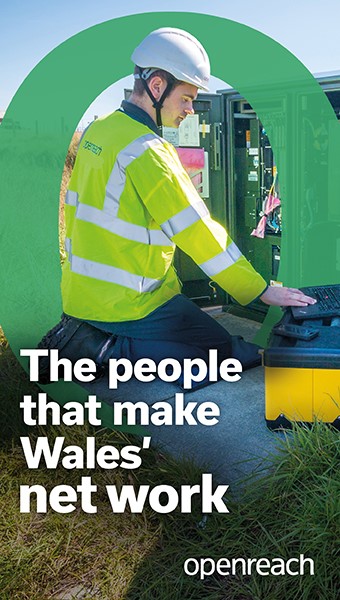Investment in full fibre and mobile connectivity in Wales could unlock 24,000 jobs, boost the economy by more than £2.46 billion by 2026 and help tackle inequality according to new research from Virgin Media O2 and economic modelling experts Oxford Analytica.
The research reveals investment could provide a multi-million-pound economic boost to regions across Wales, with the Cardiff Capital Region (£896m), North Wales (£407m) and Mid Wales (£99m) all set to see sizable economic uplifts.
The findings are revealed in the first ever Digital Connectivity Index which uses thousands of OECD datapoints to measure how individuals and organisations can connect with one another and the rest of the world through high-quality internet access. The Index, the first of its kind, assesses the quality of connectivity infrastructure across OECD countries and finds the UK is currently ranked joint 8th out of 24 OECD countries publishing complete digital connectivity datasets – well into the top half of countries scored and just ahead of Germany, Portugal and Ireland.
The Digital Connectivity Index also reveals how upgrading mobile and broadband networks can support economic growth and help the country to level up. If the UK were to become the OECD leader, it may unlock consistently higher GDP growth rates (0.88%) every year, equating to £69.78 billion in extra GDP and 510,000 jobs between now and 2026.
Lutz Schüler, Chief Executive Officer of Virgin Media O2, said:
“The importance of digital connectivity to Wales’ future couldn’t be clearer, and the role we play as an industry more profound.
“With economic growth, new jobs and a fairer society at stake, we’re already taking a lead with a commitment to invest £10 billion over the next five years.
“We’re turning up the dial on the national recovery and helping the country to climb up the international connectivity league tables to create a brighter, more prosperous future for every corner of the UK.”
Scott Urban, Senior Advisor at Oxford Analytica, said:
“The Digital Connectivity Index shows telecom’s key contribution to levelling-up through spurring higher growth and creating new jobs.”
The research has been commissioned by Virgin Media O2, as part of its mission to upgrade the UK. The company has committed to investing £10 billion over the next five years, with plans to expand 5G coverage to cover 50% of the population by 2023 and upgrade its entire fixed network to full fibre to the premises by 2028.
This is alongside the company’s continued gigabit roll-out, which will see 1.1Gbps speeds delivered across its entire broadband network in Wales before the end of the year, and its mobile network upgrade – providing a 4G upgrade to 2,300 postcodes in Wales since the start of the year, including Sophia Gardens Cricket Ground, Conwy Suspension Bridge and Swansea railway station.
Addressing the digital divide
Whilst the research shows that the UK has improved its level of digital connectivity well above the OECD average between 2011 and 2019, addressing the UK’s digital divide is key to making further gains.
The findings reveal that people living in more deprived areas of the country, in rural areas and lower income households are most at risk of digital exclusion. As many as 1 in 10 of those with a household income of £15,000 a year or less do not have an internet connection at home, whilst those living in rural areas are twice as likely to report suffering from poor internet connections as those living in urban areas.
To help address digital poverty, in July 2021 Virgin Media O2 played a leading role in launching the UK’s first ever National Databank – providing free mobile data to people in need. Through the databank, 7.5 million GB of O2 mobile data will be donated to help over 200,000 people get connected by the end of 2023, with other mobile operators also able to contribute data to the platform.
This is alongside Virgin Media’s Help for Home Learners initiative and O2’s Community Calling programme which provided data and devices to support vulnerable customers during the Covid-19 pandemic, and Virgin Media’s Essential Broadband service for customers who are struggling financially and receiving Universal Credit.
Through its Project Lightning programme, the company is also expanding its network to reach more communities nationwide.
This is as well as collaborating with Government and other mobile providers to deliver a Shared Rural Network (SRN) which will see 4G coverage rise from the current level of 66% to 84%; all operators cover at least 90% of UK landmass and 4G services reaching an additional 280,000 premises and 10,000 miles of roads by 2026.
Digital Connectivity Index – OECD countries ranked
| Country | Index Score | Rank |
| Denmark | 86 | 1 |
| Netherlands | 81 | 2 |
| Sweden | 80 | 3 |
| Finland | 77 | 4 |
| Luxembourg | 74 | 5 |
| Estonia | 74 | 5 |
| Slovenia | 74 | 7 |
| Lithuania | 72 | 8 |
| Norway | 72 | 8 |
| Spain | 72 | 8 |
| United Kingdom | 72 | 8 |
| Germany | 71 | 12 |
| Portugal | 70 | 13 |
| Belgium | 70 | 13 |
| Ireland | 67 | 15 |
| Austria | 65 | 16 |
| Czech Republic | 62 | 17 |
| Hungary | 60 | 18 |
| Poland | 59 | 19 |
| France | 56 | 20 |
| Slovak Republic | 54 | 21 |
| Italy | 54 | 21 |
| Latvia | 51 | 23 |
| Greece | 49 | 24 |
About Virgin Media O2
Virgin Media O2 launched on 1 June 2021, combining the UK’s largest and most reliable mobile network with a broadband network offering the fastest widely-available broadband speeds. It is a customer-first organisation that brings a range of connectivity services together in one place with a clear mission: to upgrade the nation. Virgin Media O2 is the corporate brand of the 50:50 joint venture between Liberty Global and Telefónica SA, and one of the UK’s largest businesses.
The company has 47 million UK connections across broadband, mobile, TV and home phone. Its own fixed network currently passes 15.5 million premises alongside a mobile network that covers 99% of the nation’s population with 4G, and 210 towns and cities with 5G services. Virgin Media O2 is committed to delivering gigabit broadband speeds across its entire network footprint by the end of 2021 and plans to upgrade its fixed network to full fibre to the premises with completion in 2028.
Virgin Media O2 is a major investor in the UK. It employs around 18,000 people, has more than 430 retail stores and has committed to invest at least £10 billion over the next five years.
Integration work is progresses at pace, with Virgin Media and O2 launching a joint product – Volt – in less than 5 months from coming together.
Today, the business delivers award-winning broadband and WiFi connectivity to homes as well as providing a connected entertainment service. This brings together live TV, thousands of hours of on-demand programming and a wide-selection of apps to customers through a set-top box and on-the-go through tablets and smartphones.
It also provides 2G, 3G, 4G and 5G mobile services, and is the network of choice for mobile virtual network operators giffgaff, Sky Mobile and Lycamobile, as well as managing a 50:50 joint venture with Tesco for Tesco Mobile.
Virgin Media O2 Business plays a leading role in supporting the public sector and businesses of all sizes. This includes a variety of managed connectivity services and flexible working capabilities, security, data insight, 5G private networks and cloud solutions, as well as wholesale services to other operators and partners.
Awards for Virgin Media and O2’s telecommunications services include recognition by GWS for having the most reliable UK mobile network for three years in a row (2021, 2020, and 2019) and winning the publicly voted Uswitch awards in 2021 for the fourth consecutive year for Best Network Coverage (mobile) and Fastest Broadband Provider. At the 2021 Mobile Industry Awards O2 claimed two wins – Network of the Year, and Best Online Retailer.
Virgin Media O2 is committed to using the power of connectivity to supercharge communities across the UK, taking action to close the digital divide and helping to build an inclusive, resilient, and low carbon economy. The company has an ambition to achieve net zero carbon operations (scopes 1 & 2) by the end of 2025.





